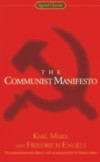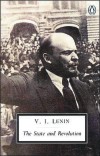|
Books
Celebrating
May 1
 The
Communist Manifesto The
Communist Manifesto
By Karl Marx and Friedrich Engels
"A
spectre is haunting Europe," Karl Marx and Frederic Engels
wrote in 1848, "the spectre of Communism." This
new edition of The Communist Manifesto, commemorating the
150th anniversary of its publication, includes an introduction
by renowned historian Eric Hobsbawm that reminds us of the
document's continued relevance. Marx and Engels's critique
of capitalism and its deleterious effect on all aspects of
life, from the increasing rift between the classes to the
destruction of the nuclear family, has proven remarkably prescient.
Their spectre, manifested in the Manifesto's vivid prose,
continues to haunt the capitalist world, lingering as a ghostly
apparition even after the collapse of those governments which
claimed to be enacting its principles.
 State
and Revolution State
and Revolution
By Vladimir Ilyich Lenin
In
July 1917, when the Provisional Government issued a warrant
for his arrest, Lenin fled from Petrograd; later that year,
The October Revolution swept the Bolsheviks to supreme power.
In the short intervening period he spent in Finland, he wrote
his impassioned, never-completed masterwork on the state and
revolution. This powerfully argued book offers both the rationales
for the new regime and a wealth of insights into Leninism.
It was here that Lenin justified his personal interpretation
of Marxism, savaged his opponents and set out his trenchant
views on class conflict, the lessons of earlier revolutions,
the dismantling of the bourgeois state and the replacement
of capitalism by the, dictatorship of the proletariat. The
result, as Robert Service suggests in his stimulating Introduction,
is 'a choral ode to action, intolerance, combat and collectivism,
the anthem of Bolshevism in its revolutionary era'. Immediately
established as a standard text, it was selectively cited by
leaders from Stalin to Gorbachev in support of programmes
which differed in important ways. As both historical document
and political statement, its importance can hardly be exaggerated.
 Trotsky
as Alternative Trotsky
as Alternative
By Ernest Mandel
First
published in 1992 by Dietz Verlag, Berlin. An appreciative
yet critical portrait of Trotsky's thought, examining his
struggles against Stalin's bureaucracy; his formulation of
an alternative economic strategy; his theories relating to
the Third World, fascism, and the national question; and his
extensive literary criticism.
These reviews are downloaded from various websites on the
net.
Compiled
by: Sanyat Sattar
Copyright
(R) thedailystar.net 2005
|
